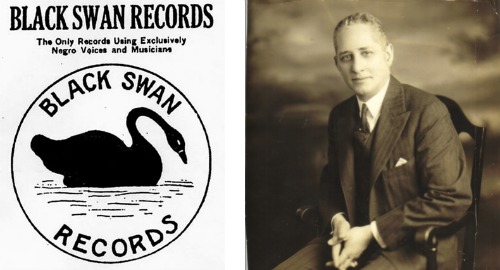Record Label of the Week: Black Swan Records
In the early 1920s, the American music industry was dominated by a handful of large companies that primarily featured white artists, leaving African American musicians with limited opportunities. It was within this context that Black Swan Records emerged, distinguishing itself as the first major record label owned and operated by African Americans. Founded in 1921 by Harry Pace, a former business partner of the renowned W.C. Handy, Black Swan Records played a pivotal role in elevating the talents of African American musicians and contributing to the early development of jazz, blues, and gospel music.

Harry Pace was a man of remarkable vision and determination. Establishing Black Swan Records in Harlem, New York, he sought to create opportunities for African American artists who were often marginalized by the mainstream recording industry. The label was named after Elizabeth Taylor Greenfield, a celebrated African American opera singer affectionately known as “The Black Swan.” This name was chosen to symbolize the elegance, sophistication, and resilience of African American culture. From its inception, Black Swan Records was committed to challenging the racial prejudices of the time by producing high-quality recordings that showcased the rich artistry of Black musicians.
The label’s early success can be attributed to its ability to attract some of the most talented African American artists of the era. Among its most famous artists was Ethel Waters, who recorded several notable hits for Black Swan, including “Down Home Blues” and “Oh Daddy.” These songs resonated not only with African American audiences but also with white listeners, underscoring the universal appeal of the music. The label’s catalog also featured jazz greats such as Fletcher Henderson and James P. Johnson, whose recordings contributed significantly to the burgeoning Harlem Renaissance.
Jazzin Babies Blues, Ethel Waters
Kind Lovin’ Blues, Ethel Waters
Black Swan Records was more than a mere business enterprise; it was a cultural movement aimed at uplifting and empowering the African American community. The label’s motto, “The Only Genuine Colored Record—Others Are Only Passing for Colored,” reflected its deep commitment to authenticity and pride in African American identity. Through its promotional efforts, Black Swan encouraged Black consumers to support their own artists, thereby fostering a strong sense of pride and unity within the community.
However, despite its initial success, Black Swan Records encountered substantial challenges. The label struggled to secure adequate financial backing and distribution channels, which were predominantly controlled by the major white-owned record companies. Furthermore, the economic downturn of the early 1920s and increasing competition from other labels that began signing African American artists made it difficult for Black Swan to maintain its foothold in the market. By 1923, the company was compelled to declare bankruptcy, and its assets were eventually acquired by Paramount Records.
Although Black Swan Records was short-lived, its impact on the music industry and African American culture was profound. The label provided a crucial platform for Black artists to record and distribute their music while challenging the racial barriers of the time. In doing so, Black Swan paved the way for future generations of African American musicians and entrepreneurs. The recordings produced by Black Swan remain treasured artifacts of an important era in American music history.
The influence of Black Swan Records extended far beyond its brief existence, inspiring other African American entrepreneurs to enter the music business. The label’s pioneering efforts demonstrated that there was a viable market for African American music and that Black artists deserved to be heard on their own terms. In this way, Black Swan helped to set the stage for the later success of African American-owned record labels, such as Motown and Stax.
In recent years, there has been a resurgence of interest in Black Swan Records, with collectors and historians seeking out its rare 78rpm recordings. These records serve as a testament to the artistry and innovation of the musicians who helped to shape the sound of early jazz and blues. They also stand as a poignant reminder of the challenges faced by African American artists in an industry that often resisted their ambitions.
The story of Black Swan Records serves as a powerful reminder of the importance of cultural representation and diversity in the arts. By giving voice to African American musicians during a time when their contributions were frequently marginalized, Black Swan Records broadened the scope of American music and enriched the cultural landscape. Today, the label’s legacy continues to inspire artists and entrepreneurs who seek to challenge the status quo and create opportunities for underrepresented communities.
As we reflect on the history of Black Swan Records, we are reminded of the enduring power of music as a vehicle for social change. The label’s commitment to excellence, authenticity, and cultural pride offers a compelling model for those who strive to make a difference through their art. In celebrating the achievements of Black Swan Records, we honor the rich heritage of African American music and the pioneers who laid the groundwork for future generations.
